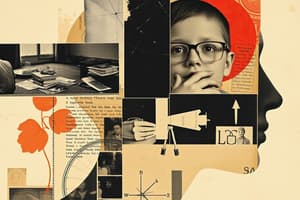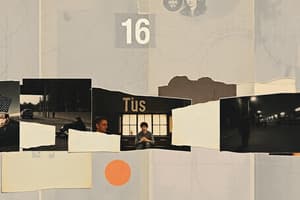Podcast
Questions and Answers
What is source misattribution commonly associated with?
What is source misattribution commonly associated with?
- Determining the accuracy of eyewitness testimonies
- Attributing incorrect sources to memories (correct)
- Recalling information without confidence
- Creating false memories intentionally
What does the misinformation effect demonstrate about memory?
What does the misinformation effect demonstrate about memory?
- Suggestive language does not impact memory recall
- Memory can be altered by misleading information after an event (correct)
- Memories cannot be influenced by external factors
- Memories are fixed and unchanging after being formed
Which experiment illustrates how false memories can be generated?
Which experiment illustrates how false memories can be generated?
- The Weapon Focus Study
- The Recall and Recognition Test
- The Emotional Memory Experiment
- The Lost in the Mall Experiment (correct)
How does emotional arousal impact memory encoding?
How does emotional arousal impact memory encoding?
What role does the amygdala play in memory formation?
What role does the amygdala play in memory formation?
What is the primary risk of the weapon focus effect during a crime?
What is the primary risk of the weapon focus effect during a crime?
What can false memories affect in legal settings?
What can false memories affect in legal settings?
Which statement regarding the impact of suggestive questioning is true?
Which statement regarding the impact of suggestive questioning is true?
What best describes autobiographical memories?
What best describes autobiographical memories?
What is the reminiscence bump primarily associated with?
What is the reminiscence bump primarily associated with?
Which hypothesis suggests that self-identity formation enhances memory recall during adolescence?
Which hypothesis suggests that self-identity formation enhances memory recall during adolescence?
How do flashbulb memories differ from regular memories?
How do flashbulb memories differ from regular memories?
What is a common misconception about flashbulb memories?
What is a common misconception about flashbulb memories?
According to the constructive nature of memory, what influences how events are recalled?
According to the constructive nature of memory, what influences how events are recalled?
What did Bartlett's 'War of the Ghosts' study demonstrate about memory?
What did Bartlett's 'War of the Ghosts' study demonstrate about memory?
Which of the following statements about the amygdala is correct?
Which of the following statements about the amygdala is correct?
Flashcards
Source Monitoring
Source Monitoring
The process of determining where a memory originated, like whether you read or heard it.
Source Misattribution
Source Misattribution
Mistakes in source monitoring, leading to confusion about the true origin of information, like thinking a book story happened in real life.
Misinformation Effect
Misinformation Effect
When misleading information given after an event changes someone's memory of the original event.
False Memories
False Memories
Signup and view all the flashcards
Amygdala
Amygdala
Signup and view all the flashcards
Emotion and Memory
Emotion and Memory
Signup and view all the flashcards
Weapon Focus
Weapon Focus
Signup and view all the flashcards
Emotionally Charged Memories
Emotionally Charged Memories
Signup and view all the flashcards
What are autobiographical memories?
What are autobiographical memories?
Signup and view all the flashcards
What is the reminiscence bump?
What is the reminiscence bump?
Signup and view all the flashcards
Why do we remember those years so well? (Self-Image Hypothesis)
Why do we remember those years so well? (Self-Image Hypothesis)
Signup and view all the flashcards
Why do we remember those years so well? (Cognitive Hypothesis)
Why do we remember those years so well? (Cognitive Hypothesis)
Signup and view all the flashcards
Why do we remember those years so well? (Cultural Script Hypothesis)
Why do we remember those years so well? (Cultural Script Hypothesis)
Signup and view all the flashcards
What are flashbulb memories?
What are flashbulb memories?
Signup and view all the flashcards
Are flashbulb memories always accurate?
Are flashbulb memories always accurate?
Signup and view all the flashcards
What is the reconstructive nature of memory?
What is the reconstructive nature of memory?
Signup and view all the flashcards
Study Notes
Autobiographical Memory
- Autobiographical memories are detailed personal experiences, including sensory and emotional elements, tied to self-identity.
- These memories are rich with spatial, emotional, and sensory details.
- Autobiographical memories shape and reinforce self-concept by creating a narrative of life experiences.
The Reminiscence Bump
- The reminiscence bump is a tendency for people over 40 to recall more memories from adolescence and early adulthood.
- The self-image hypothesis suggests strong memory formation during this period due to identity development.
- High novelty in this period encourages stronger encoding of memories.
- The cultural life script hypothesis links strong memories to expected life milestones during this time.
Flashbulb Memories
- Flashbulb memories are vivid memories of surprising and significant events with strong confidence.
- Studies indicate these memories, despite confidence, are not always accurate; details can change over time.
- Emotional intensity activates the amygdala, enhancing memory encoding without guaranteeing accuracy.
Constructive Nature of Memory
- Memory is a reconstructive process, influenced by schemas and beliefs, leading to adjusted recollections.
- Bartlett's "War of the Ghosts" study showed how cultural expectations transform memories, adapting them to existing frameworks.
Source Monitoring and Source Misattribution
- Source monitoring involves determining memory origin (e.g., where did I learn this?).
- Source misattribution leads to errors in discerning memory origin, like mistaking heard or read information for actual experiences.
The Misinformation Effect
- The misinformation effect happens when post-event misleading information alters memory for the original event.
- Loftus' research demonstrated that wording changes (e.g., "smashed" vs. "hit") influence memory of events.
- This effect reveals memory's malleability and raises concerns for eyewitness testimony.
False Memories
- False memories are recollections of events that never happened or are misremembered.
- Suggestive questioning or visualization can implant false memories.
- The "Lost in the Mall" experiment showcased how easily false memories can be created through suggestion.
Emotion and Memory
- Emotional arousal during events strengthens encoding.
- The amygdala plays a critical role in forming emotional memories.
- Intense emotions lead to vivid memories, but these are still susceptible to distortion.
- Weapon focus affects memory accuracy by narrowing attention to a weapon during a crime.
Studying That Suits You
Use AI to generate personalized quizzes and flashcards to suit your learning preferences.




